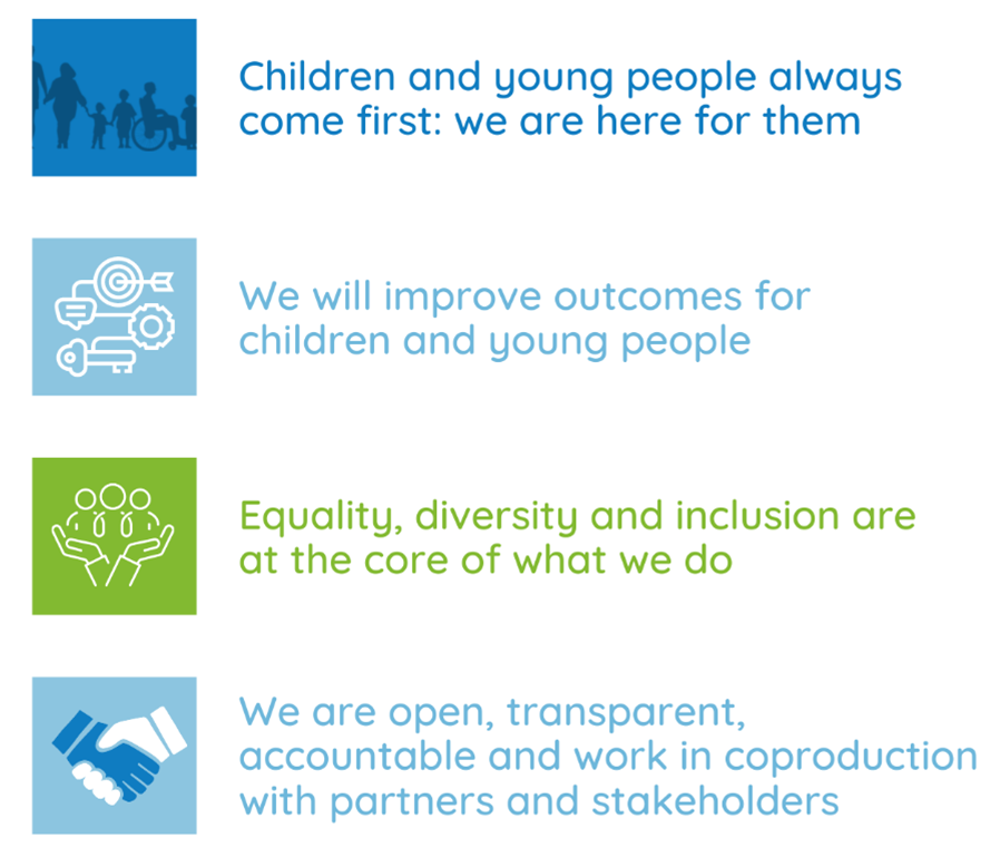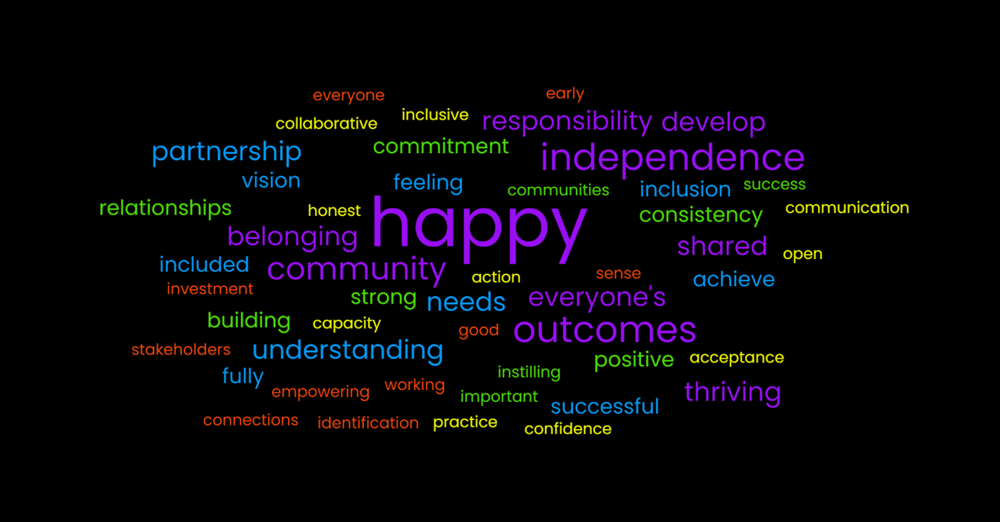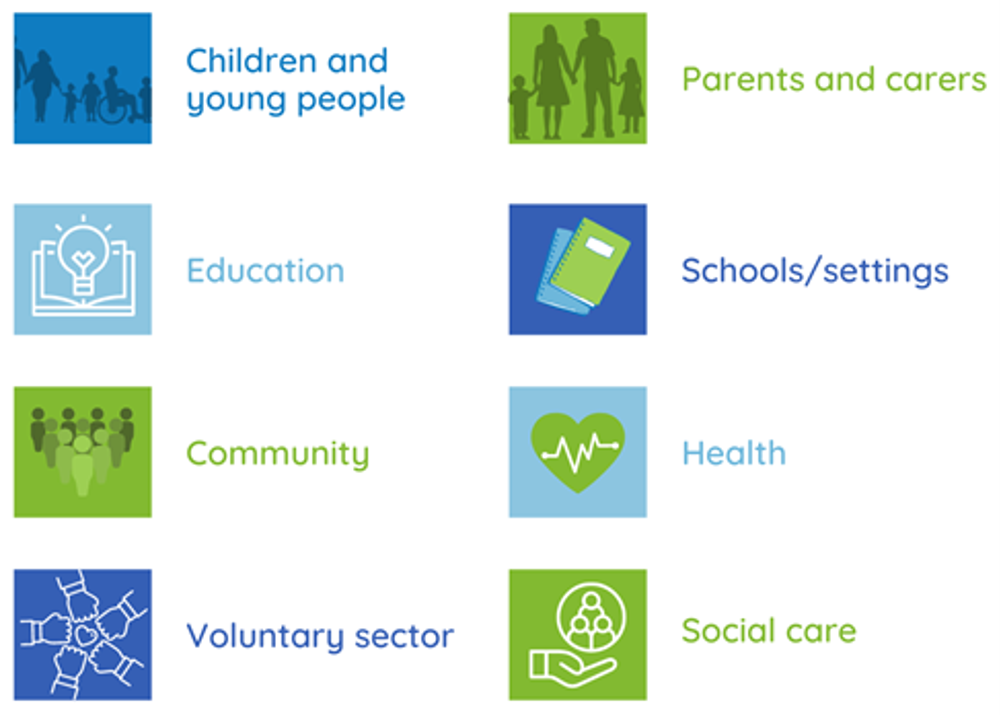Our council
We're a force for continual improvement through shared responsibility, intelligence and commitment to achieve the best outcomes for all our children and young people.
Find out about our values, partners and stakeholders.
Our guiding principles and values
We use the phrase 'a force for continual improvement' to acknowledge that our work is targeted towards improved early identification, support, services and provision across education, health and care.
By using intelligence and being committed, we make sure our work responds to the needs of the local area, is evidence based and we take responsibility for the commitments we make to our children and young people.
Being responsible indicates that we direct our resources to the areas that have the most impact and where children and young people are most at risk of poor outcomes. This means being efficient and prioritising what we know we need to focus on to provide the greatest possible level of support and provision across education, health and care.
Our approach is grounded in what works best to improve outcomes for children and young people so that they can have the best future possible and thrive as part of our local community. We work with and listen to our children and young people, parents and carers and other stakeholders to ensure our values are shared values.
Over the last few years, we've been a force for continued improvement through our SEND Improvement Programme. We've reflected the progress of this and the difference it has made so far in our revised programme, which has been updated to underpin the commitments we are making for the next phase, from 2022-2025.
Children and young people, parents and carers have driven our shared, key values. These are the cornerstones for the SEND Improvement Programme and inform everything we do.
Our values
- Children and young people always come first: we are here for them.
- We will improve outcomes for children and young people.
- Equality, diversity and inclusion are at the core of what we do.
- We are open, transparent, accountable and work in coproduction with partners and stakeholders.

Inclusion statement
Our inclusion statement demonstrates the local area’s commitment to putting children, young people and their families at the heart of everything that we do. Our drive for improvement, opportunities and equity, along with the work we do together, will improve outcomes for all.
Barnsley, the place of possibilities
Our vision is for every child and young person in Barnsley to be fully included, to be happy and thrive in their education and community so that they can develop independence, lead fulfilling lives and achieve outcomes that are important to them.

(Everyone. Early. Collaborative. Inclusive. Responsibility. Develop. Partnership. Commitment. Independence. Vision. Feeling. Communities. Inclusion. Success. Relationships. Honest. Happy. Consistency. Communication. Belonging. Happy. Shared. Open. Included. Community. Action. Sense. Achieve. Investment. Strong. Needs. Everyone's. Building. Capacity. Good. Outcomes. Stakeholders. Understanding. Instilling. Positive. Acceptance. Fully. Empowering. Working. Important. Successful. Thriving. Connections. Identification. Practice. Confidence.)
Partners and stakeholders
Communication is a big part of what's happening in Barnsley and we want this to be successful at all levels across the network of partners and stakeholders that make up the local area including:
- children and young people
- parents and carers
- education
- schools/settings
- community
- health
- voluntary sector
- social care

Parents/carers tell us they want to see the following, which we'll prioritise. We'll ensure that there are strategic actions in the underpinning SEND Improvement Programme, which can deliver these priorities:
- Parents and carers are stakeholders and should be treated and respected as such. They should be part of working groups to help to identify issues and implement changes. They can also share experiences to help professionals understand some of the impact of SEND on their lives.
- Create a physical space within the town centre where everyone can find out more about support, opportunities and provision that is available to them. This could be a drop-in shop for all SEND related information, advice and support.
- A range of smaller parent support groups as some parents/carers feel more secure and welcome in a smaller group that is about their child or young person’s needs. A coming together of more confident parents/carers from all groups, to represent views at the strategic level would be best.
- Sessions that are held in different areas of the borough on different days, and at different times so that they fit around busy lives.
- More detail about who is involved with their child or young person’s support and provision and that they have access to information about what they do and how to contact them.
- Clarity about pathways to support for different aspects of education, health and care. This includes levels of SEND, early help, diagnostic pathways and who does what.
- The process for accessing SEND support being easy to follow and understand what options are available in schools and education settings.
- That staff in schools and education settings are trained to support the processes related to SEND and how to work effectively with parents/carers.
- A lending library of resources for SEND being available so that they can borrow resources, rather than spending money to find out that resources are not right for them and their child or young person.
- Peer mentoring from other parents/carers is seen as positive and can help many other parents/carers. This can be supported by peer mentors being well supported themselves by services, for example, accessing training and advice.
As a result, parents/carers of children and young people with SEND will:
- feel like valued partners within the system
- be part of working groups and influence decision making across the local area
- have readily available access to SEND information and services
- have a network of opportunities to gain support and be able to share their ideas and experiences in a way that works for them
- understand what each service is, what they do and how a service can be accessed
- have a strong understanding of the graduated approach and how to access appropriate support at the right time
- have confidence that schools and settings understand the needs of their child
- have access to loaned resources (eg sensory tools)
- be able to access a trained peer support network
